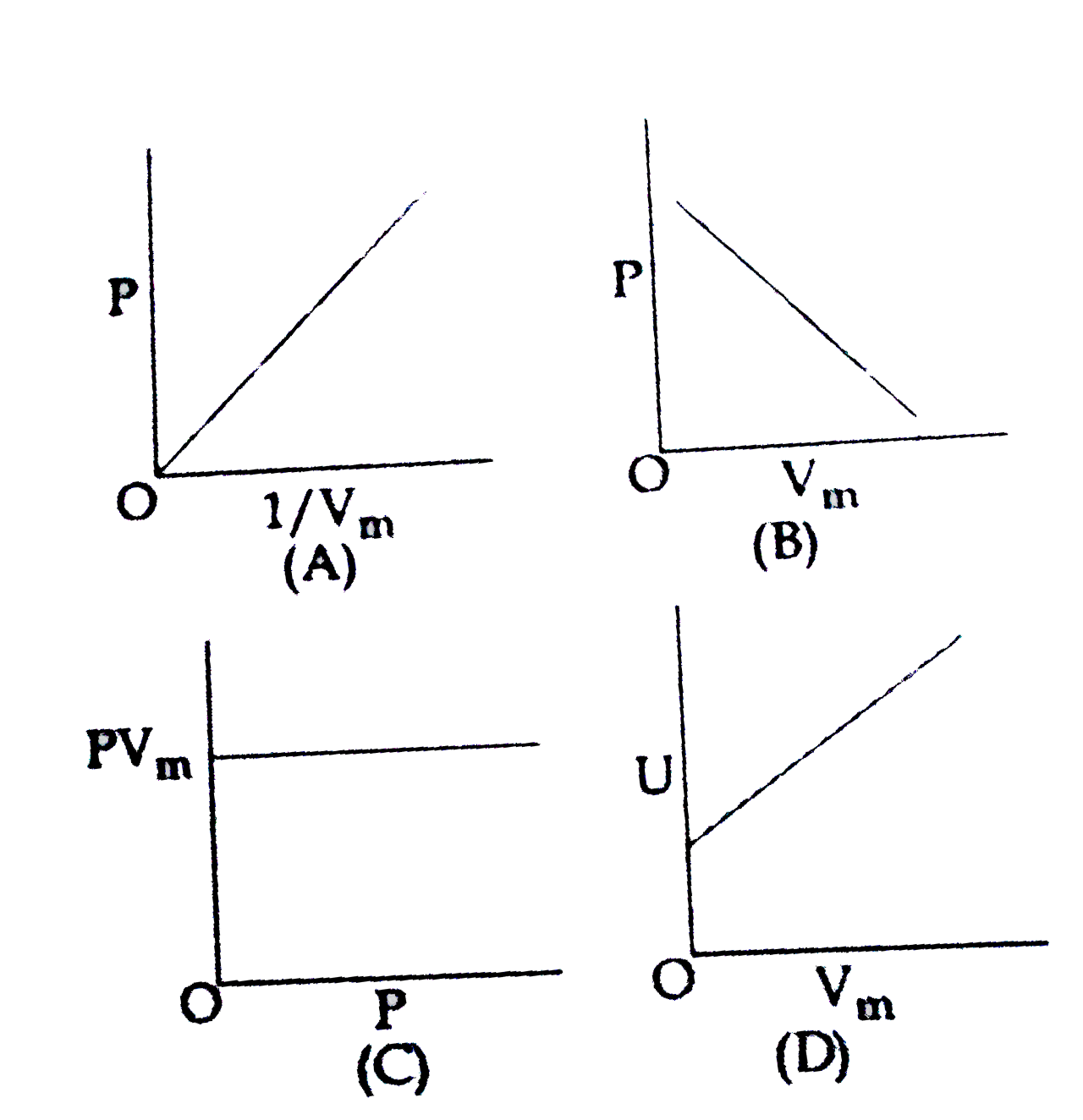The work done by 100 calorie of heat in isothermal expansion of ideal gas is :-
418.4 J
4.184 J
41.84 J
None
The correct Answer is:A
To solve the problem of calculating the work done by 100 calories of heat in the isothermal expansion of an ideal gas, we can follow these steps:
Step 1: Understand the conditions of the problem
The problem states that the process is isothermal, which means that the temperature remains constant throughout the expansion. Therefore, the change in temperature (ΔT) is equal to 0.
Hint: Recall that in an isothermal process, the internal energy change (ΔU) of an ideal gas is also zero.
Step 2: Apply the first law of thermodynamics
According to the first law of thermodynamics, we have the equation:
ΔU=Q+W
Where:
- ΔU = Change in internal energy
- Q = Heat added to the system
- W = Work done by the system
Since we established that ΔU = 0 for an isothermal process, we can rewrite the equation as:
0=Q+W
This implies:
Q=−W
Hint: Remember that if the system does work on the surroundings, the work done (W) is considered negative.
Step 3: Determine the sign of work done
In this case, since the work is done by the system, we take W to be negative. Therefore, we can express it as:
Q=−W
or
W=−Q
Hint: Keep in mind that if heat is added to the system (Q > 0), then the work done by the system (W) will be negative.
Step 4: Substitute the value of heat (Q)
The problem states that the heat (Q) is 100 calories. Therefore:
W=−100 calories
Hint: Make sure to convert calories to joules, as the final answer is required in joules.
Step 5: Convert calories to joules
We know that:
1 calorie=4.184 joules
Thus, for 100 calories:
W=−100×4.184 joules
W=−418.4 joules
Hint: When converting, multiply the number of calories by the conversion factor to get the equivalent in joules.
Step 6: Conclusion
The work done by the system during the isothermal expansion of the ideal gas, when 100 calories of heat is added, is:
W=−418.4 joules
Since the question asks for the work done by the heat, we can state that the work done is 418.4 joules (considering the magnitude).
Final Answer: The work done by 100 calories of heat in isothermal expansion of an ideal gas is approximately 418.4 joules.
The problem states that the process is isothermal, which means that the temperature remains constant throughout the expansion. Therefore, the change in temperature (ΔT) is equal to 0.
According to the first law of thermodynamics, we have the equation:
ΔU=Q+W
Where:
- ΔU = Change in internal energy
- Q = Heat added to the system
- W = Work done by the system
0=Q+W
This implies:
Q=−W
In this case, since the work is done by the system, we take W to be negative. Therefore, we can express it as:
Q=−W
or
W=−Q
The problem states that the heat (Q) is 100 calories. Therefore:
W=−100 calories
We know that:
1 calorie=4.184 joules
Thus, for 100 calories:
W=−100×4.184 joules
W=−418.4 joules
The work done by the system during the isothermal expansion of the ideal gas, when 100 calories of heat is added, is:
W=−418.4 joules
Topper's Solved these Questions
- THERMODYNAMICS BOOK - ALLENCHAPTER - THERMODYNAMICS EXERCISE - EXERCISE -3
108 Videos
- THERMODYNAMICS BOOK - ALLENCHAPTER - THERMODYNAMICS EXERCISE - EXERCISE -4
18 Videos
- THERMODYNAMICS BOOK - ALLENCHAPTER - THERMODYNAMICS EXERCISE - EXERCISE -1B
22 Videos
- TEST PAPERSBOOK - ALLENCHAPTER - TEST PAPERSEXERCISE - MATHEMATICS
2 Videos
- Thermodynamics And Thermo ChemistryBOOK - ALLENCHAPTER - Thermodynamics And Thermo ChemistryEXERCISE - All Questions
40 Videos
Similar Questions
For an isothermal expansion of an ideal gas
View SolutionIn the isothermal expansion of an ideal gas
View Solutionisothermal elasticity of an ideal gas is
View SolutionFor isothermal expansion in case of an ideal gas :
View SolutionIn reversible isothermal expansion of an ideal gas :
View SolutionIn an isothermal expansion of an ideal gas. Select wrong statement:
View SolutionDuring the isothermal of an ideal gas :
View SolutionIn an isothermal process for an ideal gas
View SolutionThe combination of plots which does not represent isothermal expansion of an ideal gas is :

View SolutionThe combination of plots which does not represent isothermal expansion of an ideal gas is :
View Solution
